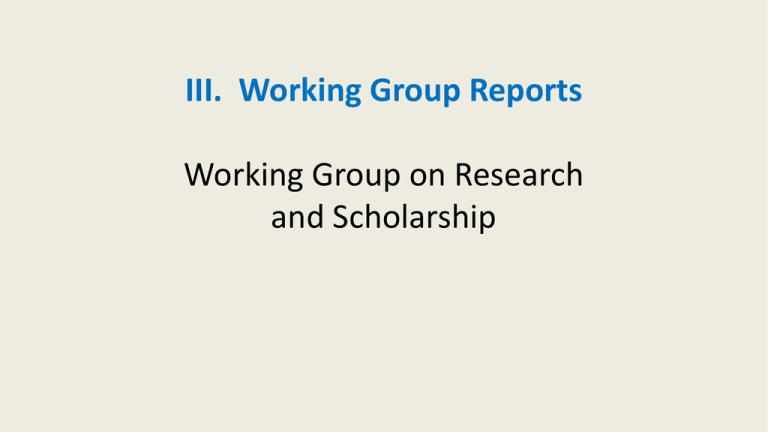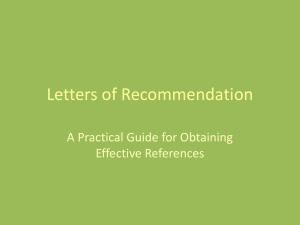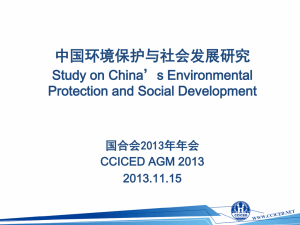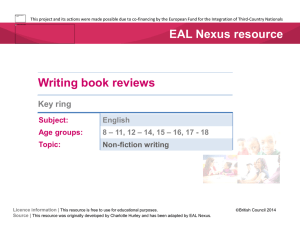III. Working Group Reports Working Group on Research and
advertisement

III. Working Group Reports Working Group on Research and Scholarship Introduction by Working Group Chair Moshe Vardi Members of Working Group Janet Braam, Biochemistry and Cell Biology Keith Cooper, Computer Science Michael Deem, Bioengineering Mahmoud El-Gamal, Economics Michael Emerson, Sociology Richard Grandy, Philosophy Randy Hulet, Physics Steve Lewis, Baker Institute for Public Policy Seiichi Matsuda, Chemistry Vikas Mittal, Jones School Jan E. Odegard, Ken Kennedy Institute for Information Technology Fred Oswald, Psychology Charge – Fall 2011 “The Senate Working Group on Research and Scholarship will assess the processes and structures currently existing on campus designed to support and improve Rice's research and scholarship efforts, including strategy, support structures, assessment, and coordination and planning from the department level to the upper administration level.” Outline of Report I. II. III. IV. Members and Charge of Working Group Executive Summary Background Culture Recommendation A1 Recommendation A2 Recommendation A3 Recommendation A4 V. Faculty Recommendation B1 Recommendation B2 Recommendation B3 Recommendation B4 Outline, continued VI. Research Funding Recommendation C1 Recommendation C2 VII. Doctoral Programs Recommendation D1 Recommendation D2 Recommendation D3 Recommendation D4 VIII. Undergraduate Research Recommendation E1 Recommendation E2 IX. Schools Recommendation F1 Outline, continued X. Research Infrastructure Recommendation G1 Recommendation G2 XI. Administrative Infrastructure Recommendation H1 Recommendation H2 XII. Resources Recommendation I1 Recommendation I2 XIII. Shared Governance Recommendation J1 XIV. Summary IV. Culture Recommendation A1✪✪ Rice should develop a systematic process for an external quality review of programs, departments, schools, and administrative offices. a) The recently launched academic-review process is to be commended, but it is yet to be fully systematized. b) Reviews should be preceded by prior conversation on metrics and benchmarks, semi-standardized self-study and review questions. c) There should be a follow-up process to ensure that reviews are consequential. For example, such a process may include unit response, review by school-wide committee, decanal response, review by standing university committee, and internal follow-up review. d) The Senate should appoint a group to work with the administration to develop a systematic academic review process. ✪✪ Responsibility: Provost, Vice Presidents, Vice Provost for Academic Affairs, Dean of Graduate Studies, School Deans, and Senate. IV. Culture Recommendation A2 Rice should develop processes for establishing accountability of academic units. a) All academic administrators, from department chair upwards, should submit annual reports, consisting of public and private sections. b) All academic administrators should receive timely and constructive responses from higher-ups on their reports. Responsibility: Provost, Vice Provosts, Senate, and Deans IV. Culture Recommendation A3 Rice should develop processes for major academic organizational decision making. a) Although there is a process at Rice for starting new academic programs, there is no process for terminating programs. (Comment: This process is currently being formulated for graduate programs.) There is also no clear process for decision making regarding academic unit reorganization such as splitting or merging units (although a recent case example has taken place in engineering). A clear process should not limit organizational flexibility, but should provide a roadmap for consultation and decision making. b) In practice, almost all proposed major academic organizational changes encounter a significant level of opposition that makes it quite difficult to carry out such changes. Framing proposed changes within a larger plan to improve academic quality can help to generate buy-in by all constituents when change is necessary. c) School-based faculty advisory committees with distinguished faculty/senate members could advise deans on major issues as part of a more transparent decision-making process. Responsibility: Provost, Senate, Deans IV. Culture Recommendation A4 Rice should rethink its budget process to allow for longer- term planning, a broader strategic discussion of priorities and tradeoffs, a closer alignment with strategic priorities, and enhanced flexibility and incentives for academic units at all levels. Responsibility: President V. Faculty Recommendation B1 The Provost should appoint a full-time Vice-Provost for Academic Affairs (VPAA), responsible for the ongoing stewardship of the faculty, including, for example, faculty development and mentoring, compilation of data on the faculty (jointly with the Office of Institutional Research), and coordination of nominations of faculty members for various honors (see also Recommendation 2). (Comment: This recommendation is the process of being implemented, as a consequence of an earlier draft of this report.) V. Faculty Recommendation B2 ✪✪ The President and Senate should establish a new standing faculty committee, Committee on Academic Affairs (replacing the current Faculty Advisory Committee of the Office of Faculty Development), whose duties may include: a) Advise on the duties of the VPAA. b) Serve as an advisory body for the VPAA. c) Advise the administration and the Senate on non-research faculty-related policies. d) Provide faculty oversight of the academic external review process. e) Develop a faculty-data dashboard. f) Develop guideline for a “faculty-career ladder,” including service expectations, annual reports, and periodic reviews. V. Faculty Recommendation B3✪✪ Developing high standards for promotion and tenure is critical to the quality of the faculty at Rice. a) Regular discussions on hiring, promotion, and tenure standards should be held among the President, Provost, deans, and chairs. b) The President makes final decisions on promotion and tenure. In borderline cases, the President should lean towards denial. c) The Senate should review Rice’s midterm-review process for assistant professors to examine its effectiveness.✪✪ V. Faculty Recommendation B4 The President and the Provost, working with the Senate, should develop a coherent plan for the size, distribution (by intellectual area), and demographics of the faculty at 5, 10, and 20 years, as well as a strategy to develop the resources needed to implement that plan. VI. Research Funding Recommendation C1 Faculty productivity should become an institution-wide topic of conversation.✪✪ a) Data on faculty productivity should be included in the public part of departmental and school reports. b) Deans and chairs should conduct regular conversations with faculty on their productivity. c) It is the job of deans to create a culture of faculty research and grant productivity: to define expectations, provide resources and incentives, offer encouragement, and create a climate of positive peer pressure to encourage faculty to raise their own profile and that of their discipline. d) Rice should issue an annual research and scholarship report, according to a template developed by the Research Committee.✪✪ Responsibility: Deans, chairs, Vice Provost for Research, Senate VI. Research Funding Recommendation C2✪✪ The Vice Provost for Research (VPR) should strengthen the Office for Research Development, to help identify opportunities, to help faculty form competitive research teams, and to pursue large strategic opportunities. See, for example, http://research.utk.edu/proposal-support/researchdevelopment-team/.✪✪ a) The Research Committee should work with the VPR to develop a proposal for a Rice Office of Research Development.✪✪ b) The Research Committee should work with the VPR to create incentives that will spur and reward faculty effort at creating center-scale activities at Rice.✪✪ VII. Doctoral Programs Recommendation D1 The Provost should appoint a full-time DGPS with overall responsibility and accountability for oversight of graduate programs and with the mission of pursuing vigorously Point 3 of the V2C. (Comment: There is a search underway for a full-time DGPS, as a consequence of an earlier draft of this report.) VII. Doctoral Programs Recommendation D2 School deans should appoint associate deans for graduate education and school-wide graduate committees to provide school-level oversight of graduate programs, as well as to discuss schoolwide priorities, tradeoffs, and best practices. These associate deans should report not only to their school deans, but also (via a “dotted line”) to the DGPS. VII. Doctoral Programs Recommendation D3✪✪ The Senate should appoint a group (Graduate Council or an adhoc working group) to study further graduate governance at Rice. The group should study graduate governance in peer institutions (including the graduate-school issue) and recommend a governance model for Rice that would clarify the relationships, including funding authority, between the DGPS and school deans and between school-level graduate committees and Graduate Council.✪✪ VII. Doctoral Programs Recommendation D4✪✪ The Senate should appoint a group (Graduate Council or an adhoc working group) to work with the new DGPS and develop an implementation plan for Point 3 of the V2C, including the desired (and feasible) level of investment by Rice, a more effective recruiting of doctoral students, and ongoing quality assessment of doctoral programs.✪✪ VIII. Undergraduate Research Recommendation E1✪✪ The Senate should appoint a group (standing committee or ad-hoc group) to compile an inventory of all undergraduate research programs at Rice, study best practices at peer institutions, and develop a proposal for a comprehensive Rice program for undergraduate research (including research internships). ✪✪This proposal should include also a governance structure. In analogy to our proposal for oversight of graduate programs, the Working Group believes that the first level of undergraduate-research oversight should reside at the schools, via departmental undergraduate research coordinators, school-wide undergraduate research committees, and associate deans for undergraduate education. VIII. Undergraduate Research Recommendation E2 The Provost should assign overall oversight responsibility for undergraduate research to the Dean of Undergraduates and charge him/her with the task of working with school deans and the Senate to create a well-resourced, highquality institutional undergraduate-research program. IX. Schools Recommendation F1 The Provost and the School Deans, working with the Senate, should develop school-by-school strategic plans to strengthen the academic schools at Rice. The planning process must include the definition of schoolspecific benchmarks and metrics that address the issue of how to move departments to the next level. To this end, the planning process should include a discussion on the pros and cons of further investments in departments and schools, and the pros and cons of mergers and other types of restructuring between departments or between schools. X. Research Infrastructure Recommendation G1 The Provost should appoint a Research Infrastructure Task Force to conduct a survey of Rice’s current research infrastructure and benchmark it against that of our peers. The Task Force should also study alternative sustainable funding models and propose a model that should be adopted by Rice. X. Research Infrastructure Recommendation G2 The Vice Provost for Research should issue an annual report, which should include a report on the status of Rice’s research infrastructure. XI. Administrative Infrastructure Recommendation H1 An expert external comprehensive analysis of Rice’s business processes, administrative systems, and administrative staffing is essential to improving the efficiency and effectiveness of Rice’s ongoing business. This analysis should be followed by an implementation plan and subsequent periodic reviews. Responsibility: President XI. Administrative Infrastructure Recommendation H2 Rice should develop a comprehensive data plan, covering both administrative and academic data. The Office of Institutional Research should dually report to both the Vice President for Finance and the Provost. The Vice Provost for IT should appoint a Chief Data Officer, to support the development and ongoing support of Rice’s data plan. Responsibility: President XII. Resources Recommendation I1✪✪ The Senate should appoint a group to work with the administration to develop an inclusive process of need assessment, based on best practices at peer institutions. The processes must be informed by the strategic plans developed by the schools.✪✪ XII. Resources Recommendation I2 The President should launch a need-assessment Task Force, led by the Provost, following the process developed by the Senate. XIII. Shared Governance Recommendation J1✪✪ The Senate should form a group (ad-hoc or standing committee) to study the incentive system for faculty participation in shared governance, survey best practices at peer institutions, and develop a plan for recognizing and rewarding shared-governance service at Rice.✪✪




